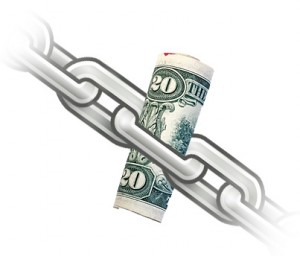
40 is the new 30, green is the new black, pale is the new tan, hipster is the new homeless, & helpful is the new viral – but when it comes to search engines and ranking algorithms Likes are the new Links.
Unless you’ve been too busy actually doing work to read the latest SEO blogs, you know that Google recently announced their plus one initiative while Bing was busy inking a deal with facebook.
While these are two huge undertakings in their own right, I think they’re just the start of a new trend in search engine algorithms – a trend that you most assuredly want to be in on from the beginning.
The paradigm of the web is shifting. Search engines are starting to move away from links and more toward other signals; and you know what? It makes perfect sense.
Meet the new boss, same as the old boss (if you don’t care about the history of Pagerank and how it works, you can skip this part)
Think back to the late 90’s when Google first came about. They turned search sideways by revolutionizing the paradigm. Instead of looking at meta tags and page content alone, Google used links. The original Pagerank algorithm was based on the model of academic citation, or what some of us computer scientists call the wandering drunk algorithm*
When Page and Brin noticed that the most important academic papers often get cited the most by other research papers they quickly realized that the same model could apply to links on the web. The most linked to sites (like the most cited papers) must be the most important. Suddenly, Google’s search results became much more useful and the web was a better place.
So if links are so awesome, why change?
Because the web is evolving. It may not seem like it, but when Google launched there was no Facebook, no Twitter, no Myspace, no Linkedin, no Foursquare, hell there wasn’t even a Friendster. Links were the signal back then. Now, we’ve got a whole lot more signals.
Not only that, but links have become very easy to manipulate. You can buy links pretty easily, and it’s trivial for anybody with a week’s worth of PHP knowledge to write a script to start automatically building them. (trust me on this one!) Quite simply, It’s very easy to manipulate links with hardly any repercussions.
So how are likes and pluses different? Can’t you buy them too?
I guess you could, theoretically, but likes and pluses are different from links in one key area: they involve your friends. See, if somebody pays me to put a link on my website it doesn’t really affect anybody. Most of my visitors will never see it. That’s not the case with likes or pluses.
If you pay me to like or +1 something, my friends see that. If it’s a page about buying pills online while refinancing my house and playing poker you can bet my friends will not only see it, but they’ll probably be very annoyed at me for posting it. How many links like that do you think I could share on Facebook or twitter before people started unfriending and unfollowing me? My guess: not many.
In fact, I tried it with sponsored tweets a few months ago. It only took 2 sponsored tweets per day to start losing a significant number of followers. (strangely, when I had it at 2 per week or less, nobody noticed)
In math terms: the Limit of Friends as paid posts goes to infinity is 0. In layman’s terms: the more sponsored posts I make the less friends I’ll retain, thus the less valuable my sponsored posts become. That’s a key difference between links and likes: The opportunity cost of spamming my friends is too high. The more I do it, the less valuable it becomes
And that’s why likes and plus ones are going to be more valuable than links. Sure, links will never die. They’ll probably always be a part of ranking algorithms, but likes and plus ones have so much more potential for making search more relevant.
The next level of search
It’s no secret that Google and Bing have been taking search in a personal, customized direction. We’ve seen results catered to location, click history, preferences, and even to my twitter feed. +1 and likes are just the next level.
Likes and pluses will never completely replace on-page relevancy, but they can certainly add to it and help refine my results in a way that links can’t. If I’m searching for something, what’s more relevant to me? The page with the most links, or the page that 20 of my friends have shared?
And that’s just a start. Imagine the possibilities of search results if we add in other signals like facebook and foursquare check ins. Say I’m in Seattle for business and am looking for a good bar. I’m in the mood for a Guinness so I pull up Google local and search “Irish pub.” What’s more useful? The closest bar to me, the one several of my friends “like” on Facebook, or the one where several of my friends have actually checked into (or gasp, left a review for!) in the past month? I’m going to want the bar where my friends actually went when they were in town (assuming they liked it)
That’s the future of search: It’s going to be a lot like dating. Pretty soon, having on-page content and links won’t be good enough. Just like having good looks or lots of tattoos, content and links will get you an invite to the party, but that’s all they’ll get you. What happens once you’re there all depends on how likable you are and what your friends have to say about you – and that might leave several sites (and SEOs) standing alone by themselves at 1:50 wondering “where do I go now?”

![url11[4]](http://www.dotcult.com/wordpress/wp-content/uploads/2011/08/url114.jpg)





